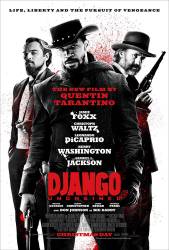Corrected entry: Leonardo DiCaprio sips on a straw twice. Straws weren't invented until 1888, 30 years after the time period of this movie.
Corrected entry: Throughout the film, various characters use what appear to be Henry or Winchester lever action rifles. The Henry wasn't introduced until 1860 and the Winchester until 1866.
Correction: The rifles could easily have been Volcanics, which predated the Henry rifle and were available in 1858.
They might have been meant to be Volcanic Rifles, but they're Henrys. You can see the distinctive external follower tab on the magazine tube at least once. Presumably reproduction Henrys exist and reproduction Volcanics don't or are as rare as hens' teeth.
Corrected entry: Dr. King Schultz states that he is a bounty hunter and that's what allows him to shoot the sheriff of the town. However, the law allowing and regulating bounty hunting and bounty hunters in the United States did come into effect until 1873. Since the setting of the film is 1858, it is not possible for him to be a bounty hunter at that time.
Corrected entry: Between the spring snowmelt and spring of 1859, Dr. Schultz and Django appear to effortlessly transport themselves from Wyoming to Mississippi, a distance of at least 1800 miles, travelling via horseback.
Correction: A horse traveling around 50 miles a day could do the trip in a little over a month. Fifty miles in a day isn't uncommon for a horse if you ride 10 or 12 hours a day. Endurance horse can cover 100 miles in a day. So, if the snow starts melting in mid March, and they get to Missouri in late April, it could be easily done and fit in the time period shown.
Corrected entry: When Schultz is speaking German to Brunhilda in the bedroom the bed is unmade then suddenly made.
Correction: Dr. Schultz is shown tidying the bed just after Brunhilda arrives.
Corrected entry: The final song mentions the Colt .45 round multiple times, but those weren't made by Colt until 1872, 14 years after the events of this movie.
Corrected entry: In the scene where Django is shooting up everybody inside Calvin Candie's estate and they have him outgunned and outmanned and they are demanding he give himself up in exchange for Broomhilda's life, one of the corpses on the floor breathes a few times.
Correction: Not all the men who fall are dead. This is made perfectly obvious by the screams of the man who is continually hit by his comrades.
Corrected entry: An oddity with percussion revolvers: the ball can penetrate clean through a human body, blowing blood and gore all over the landscape, yet it cannot penetrate a half-inch of walnut or mahogany, as evidenced by Django successfully using the cupboard as cover.
Correction: They never shot the cabinet, he gave up.
Corrected entry: Calvin Candie compares a slave to a teddy bear, even though teddy bears were not invented until the time when Theodore "Teddy" Roosevelt was president.
Correction: Calvin Candy actually refers to her as "sugar-bear", not 'teddy-bear'.
Corrected entry: Throughout the movie, Greenville, Mississippi is said to be in Chickasaw county. It is in Washington county.
Correction: It's Candieland plantation that's referred to as being in Chickasaw County, not Greenville. The plantation is obviously some distance from Greenville, so could quite easily be in another county.
Corrected entry: At the beginning of the film, a caption states the year as 1858, two years before the start of the civil war. The civil war didn't start until three years later, on April 12, 1861.
Correction: While technically a mistake, the audience learns later in the movie that the action starts in late 1858, so really the war started 2 and half years later in April 1861. So this mistake is really just a little time compression Tarantino used to say 2 years rather than 2 and half years before the war. That's not really a mistake since directors do that all the time.






Correction: Paper drinking straws were *patented* in 1888, but straws have been around for thousands of years. It is not impossible that someone else thought to make a straw of something such as paper but did not manage to acquire a patent for it.